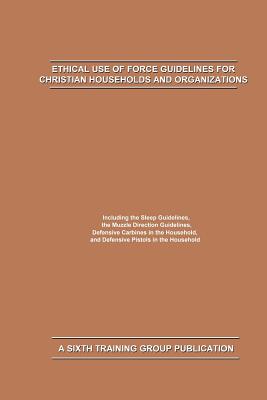

 Independently Published
Independently Published
Ethical Use of Force Guidelines for Christian Households and Organizations


Key Metrics
- Matthew Smith
- Independently Published
- Paperback
- 9781095692059
- 9.02 X 5.98 X 0.07 inches
- 0.12 pounds
- Philosophy > Ethics & Moral Philosophy
- English
 Secure Transaction
Secure TransactionBook Description
In the Christian community, there is currently a void of efforts to provide ethical guidelines for the use of force. While individuals are encouraged to be defenders of their households, and churches even promote weapons ownership as a means of protecting household members, the community has not developed or defined ethical standards for use of deadly force, or even any consensus or conversation on this subject.
It is a principle of society that you cannot oppose something with nothing. When facing this situation, leaders and defenders will inevitably be influenced by the pagan positions of disarmament or vigilantism. At best, household leaders will rely on the guidance of lawyers and courts. However, this approach places priority on maintaining legally defensive behavior, and falls short of aiming to produce ethical conduct that pleases God.
It is the mission of Sixth Training Group to provide ethical guidance for leaders and defenders. To that end, the author has prepared a set of guidelines which attempt to provide a comprehensive approach to the use of force in households and organizations.
Author Bio
I joined the University of Strathclyde and the Centre for the Social History of Health and Healthcare (CSHHH) in 2011, after completing a PhD and post-doctoral work at the University of Exeter's Centre for Medical History. My research and teaching have focussed on three primary areas within the history of health and medicine: mental health and psychiatry; allergy and immunology; and food and nutrition.
Thanks to generous funding from the Wellcome Trust, this research has contributed to one edited volume: Proteins, Pathologies and Politics: Dietary Innovation and Disease from the Nineteenth Century (Bloomsbury, 2018, co-edited by David Gentilcore); and three monographs: An Alternative History of Hyperactivity: Food Additives and the Feingold Diet (Rutgers University Press, 2011); Hyperactive: The Controversial History of ADHD (Reaktion, 2012); and Another Person's Poison: A History of Food Allergy (Columbia University Press, 2015), which was reviewed in the New York Times and given honourable mention in the Association of American Publishers' Prose Awards for 2016.
I am currently working on a monograph project on the history of social psychiatry in the United States. Funded by an AHRC Early Career Fellowship, this project investigates how American psychiatrists and social scientists viewed the connection between mental illness and social deprivation during the decades that followed the Second World War. This funding has resulted in a special issue of Palgrave Communications (co-edited with Lucas Richert) and two edited volumes, Deinstitutionalisation and After: Post-War Psychiatry in the Western World (2016) and Preventing Mental Illness: Past, Present and Future (2018), both co-edited by Despo Kritsotaki and Vicky Long, and published in the Palgrave series I co-edit with Catharine Coleborne: Mental Health in Historical Perspective.
My social psychiatry project has spurred an interest in Universal Basic Income (UBI) as a preventive mental health policy. I am currently co-leading (with Mike Danton) a Scottish Universities Insight Initiative project called Peace of Mind: Exploring Universal Basic Income's Potential to Improve Mental Health.
In future, I would like to research the history of hydrotherapy in psychiatric practice.
I believe strongly that historical research can have a significant impact on public policy and decision making. As such, I have tried to engage with the public as much as I can through broadcasting, public lecturing, blogging and speaking to health and education professionals. My efforts in these areas were enhanced in 2012 when I was named an AHRC/BBC New Generation Thinker. I have written for medical publications, such as The Lancet and the Canadian Medical Association Journal (CMAJ), presented my research to the New York City Department of Health and Mental Hygiene and work closely with a range of medical and educational professionals. Recently, my book Hyperactive was used by novelist William Sutcliffe as inspiration and research for his novel Concentr8 (Bloomsbury, 2015).
I previously served as Vice-Dean of Research for the Faculty of Humanities and Social Sciences (HaSS), following stints as Co-Director of the Centre for the Social History of Health and Healthcare, the Director of Research for History and Deputy Head of the School of Humanities. I have also served on the Executive Committee of the Society for the Social History of Medicine and the Royal Society of Edinburgh's Young Academy of Scotland. I am a Fellow of the RSA and the Royal Historical Society.
Source: The University of Strathclyde
Videos


Community reviews
Write a ReviewNo Community reviews